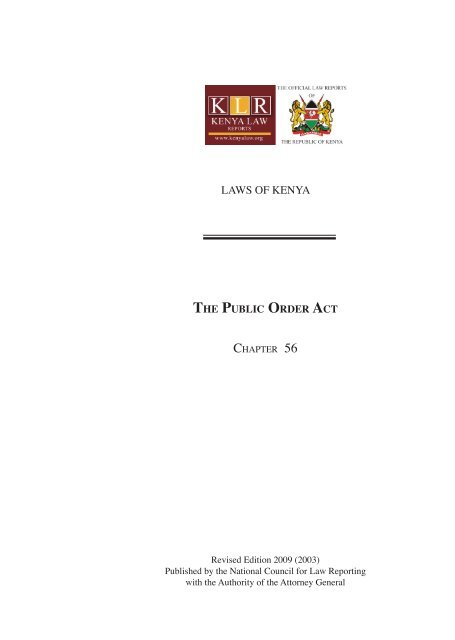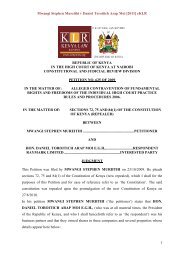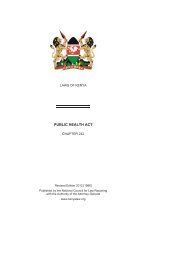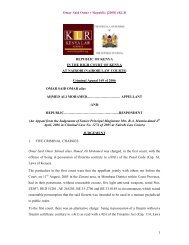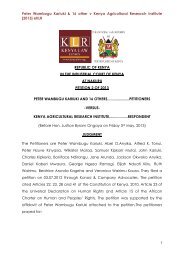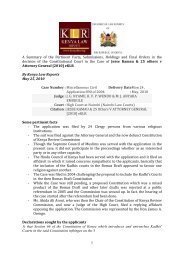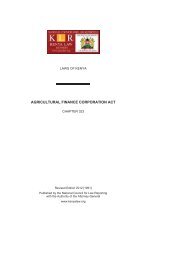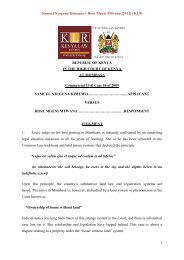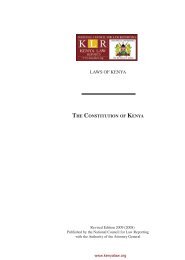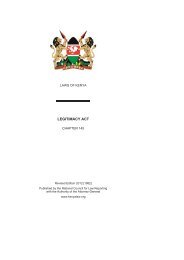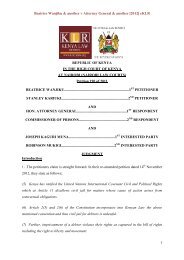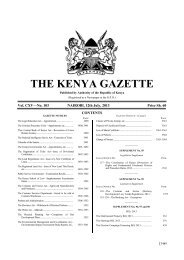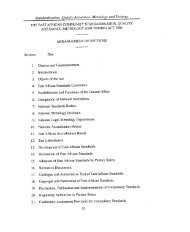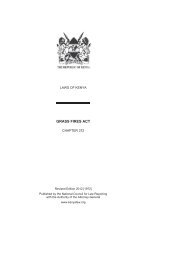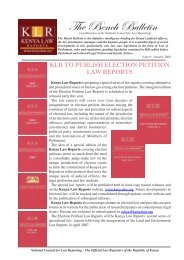Public Order Act (Cap 56) - Kenya Law Reports
Public Order Act (Cap 56) - Kenya Law Reports
Public Order Act (Cap 56) - Kenya Law Reports
Create successful ePaper yourself
Turn your PDF publications into a flip-book with our unique Google optimized e-Paper software.
LAWS OF KENYA<br />
The <strong>Public</strong> <strong>Order</strong> <strong>Act</strong><br />
Chapter <strong>56</strong><br />
Revised Edition 2009 (2003)<br />
Published by the National Council for <strong>Law</strong> Reporting<br />
with the Authority of the Attorney General
2 CAP. <strong>56</strong> <strong>Public</strong> <strong>Order</strong><br />
[Rev. 2009<br />
CHAPTER <strong>56</strong><br />
THE PUBLIC ORDER ACT<br />
ARRANGEMENT OF SECTIONS<br />
Part I—Preliminary<br />
Section<br />
1–Short title.<br />
2–Interpretation.<br />
Part II—Quasi-Military Organisations and Political Uniforms<br />
3–Prohibition of organisations equipped to usurp functions of<br />
police, etc.<br />
4–Prohibition of uniforms, etc., in connection with political<br />
objects.<br />
Part III—<strong>Public</strong> Gatherings<br />
5–Regulation of <strong>Public</strong> Meetings and Processions.<br />
6–Prohibition of offensive weapons at public meetings and<br />
processions.<br />
7–Power to prohibit entertainments and sporting events.<br />
Part IV—Curfew <strong>Order</strong>s and Curfew Restriction <strong>Order</strong>s<br />
8–Curfew orders.<br />
9–Curfew restriction orders.<br />
Part V—Flags, Banners and Emblems<br />
10–Prohibition of flags, etc., of political organisation.<br />
Part VI—Further Provisions to Safeguard <strong>Public</strong> <strong>Order</strong><br />
11–Possession of offensive weapon in public place.<br />
12–Notified liabilities.<br />
13–Award of compensation to sufferers from misconduct of<br />
inhabitants of area declared under section 47 of <strong>Cap</strong>. 84.
Rev. 2009]<br />
<strong>Public</strong> <strong>Order</strong> CAP. <strong>56</strong> 3<br />
Section<br />
Part VII—General<br />
14–Restriction on use of force.<br />
15–Service of documents.<br />
16–Presumption of authenticity of certificates.<br />
17–Penalty.<br />
18–Offences by corporations, societies, etc.<br />
19–Offences to be cognisable; and consent of Attorney-<br />
General.<br />
20–Proof of instigation, lawful authority or excuse.<br />
21–Jurisdiction.<br />
22–Regulations.
4 CAP. <strong>56</strong> <strong>Public</strong> <strong>Order</strong><br />
[Rev. 2009<br />
CHAPTER <strong>56</strong><br />
26 of 1950,<br />
36 of 1950,<br />
7 of 1958,<br />
10 of 1958,<br />
23 of 1960,<br />
53 of 1960,<br />
54 of 1960,<br />
L.N. 402/1963,<br />
3 of 1964,<br />
19 of 1964,<br />
L.N. 87/1964,<br />
L.N. 153/1965,<br />
12 of 1968,<br />
10 of 1997.<br />
Short title.<br />
Interpretation.<br />
7 of 1958, s. 2,<br />
53 of 1960, s. 3,<br />
L.N. 402/1963,<br />
L.N. 153/1965,<br />
10 of 1997, Sch.<br />
THE PUBLIC ORDER ACT<br />
Commencement : 13th June, 1950<br />
An <strong>Act</strong> of Parliament to make provision for the maintenance of public<br />
order, and for purposes connected therewith<br />
Part I—Preliminary<br />
1. This <strong>Act</strong> may be cited as the <strong>Public</strong> <strong>Order</strong> <strong>Act</strong>.<br />
2. In this <strong>Act</strong>, except where the context otherwise requires—<br />
“excluded meeting” means—<br />
(a) any meeting convened and held exclusively for the lawful<br />
purposes of any public body; or<br />
(b) any meeting of the members of any registered organization,<br />
whether corporate or unincorporate, convened in accordance<br />
with the constitution of the organization and held exclusively<br />
for the lawful purposes of that organization;<br />
(c) any meeting of the members of any trade union convened<br />
and held exclusively for the lawful purposes of that trade<br />
union;<br />
(d) any meeting convened and held exclusively for social,<br />
cultural, charitable, educational, commercial or industrial<br />
purposes;<br />
(e) any meeting of the organs of a political party, convened<br />
in accordance with the constitution of the party and held<br />
exclusively to discuss the affairs of the party;<br />
(f) impromptu “meet-the-people” tours by Members of<br />
Parliament and councillors.
Rev. 2009]<br />
<strong>Public</strong> <strong>Order</strong> CAP. <strong>56</strong> 5<br />
“hours of darkness” means the hours between half-past six in the<br />
evening and half-past six on the following morning<br />
“hours of daylight” means the hours between half-past six in the<br />
morning and half-past six in the evening;<br />
“meeting” means any gathering of persons (not being an excluded<br />
meeting) convened and held for any purpose, including any political<br />
purpose;<br />
“Minister” means the Minister for the time being responsible for<br />
the administration;<br />
“offensive weapon” means any article made or adapted for use<br />
for causing injury to the person, or intended by the person having it in<br />
his possession or under his control for such use;<br />
“political organization” means any organization which either<br />
has among its objects any political purpose or pursues any political<br />
purpose;<br />
“premises” includes any land, any building and any other place<br />
whatsoever;<br />
“private premises” means premises which are not public<br />
places;<br />
“public gathering” means a public meeting, a public procession,<br />
and any other meeting, gathering or concourse of ten or more persons<br />
in any public place;<br />
“public meeting” means any meeting, not being an excluded<br />
meeting, held or to be held in a public place;<br />
“public place” means any place to which for the time being the<br />
public or any section of the public are entitled or permitted to have access<br />
whether on payment or otherwise, and, in relation to any meeting to be<br />
held in the future, includes any place which will, on the occasion and<br />
for the purposes of such meeting, be a public place;<br />
“public procession” means any procession in, to or from a public<br />
place;<br />
“regulating officer” means the officer in-charge of the police<br />
station in the area in which a proposed public meeting is proposed to be<br />
held, or in the case of a public procession, the police officer in-charge<br />
of the police station in the area in which the procession is proposed to<br />
start and to end;
6 CAP. <strong>56</strong> <strong>Public</strong> <strong>Order</strong><br />
[Rev. 2009<br />
“school” means any premises or any part of any premises where<br />
persons are habitually or for the time being taught, whether in one<br />
class or more.<br />
Part II—Quasi-Military Organizations and<br />
Political Uniforms<br />
Prohibition of<br />
organizations<br />
equipped to usurp<br />
functions of police,<br />
etc.<br />
L.N. 87/1964.<br />
3. (1) If the members or adherents of any association of persons,<br />
whether incorporated or not, are—<br />
(a) organized or trained or equipped for the purpose of enabling<br />
them to be employed in usurping the functions of the police<br />
or of the armed forces; or<br />
(b) organized and trained or organized and equipped either for<br />
the purpose of enabling them to be employed for the use or<br />
display of physical force in promoting any political object,<br />
or in such manner as to arouse reasonable apprehension<br />
that they are organized and either trained or equipped for<br />
that purpose,<br />
then any member or adherent of such association shall be guilty of an<br />
offence and liable to a fine not exceeding one thousand shillings or to<br />
imprisonment for a term not exceeding six months, or to both such fine<br />
and such imprisonment, and any person who promotes or conspires with<br />
another to promote or who takes part in the control or management of<br />
the association, or in so organizing or training or equipping as aforesaid<br />
any member or adherent thereof, shall be guilty of an offence and liable<br />
to a fine of two thousand shillings or to imprisonment for a term not<br />
exceeding three years, or to both such fine and such imprisonment:<br />
Provided that in any proceedings against a person charged with<br />
the offence of taking part in the control or management of such an<br />
association as aforesaid it shall be a defence to that charge to prove that<br />
he neither consented to nor connived at the organization, training or<br />
equipment of members or adherents of the association in contravention<br />
of the provisions of this section.<br />
(2) No prosecution under this section shall be instituted without<br />
the consent of the Attorney-General.<br />
(3) If, upon application being made by the Attorney-General,<br />
it appears to the High Court that any association is an association of<br />
which members or adherents are organized, trained or equipped in<br />
contravention of the provisions of this section, the Court may make such<br />
order as appears necessary to prevent any disposition without the leave
Rev. 2009]<br />
<strong>Public</strong> <strong>Order</strong> CAP. <strong>56</strong> 7<br />
of the Court of property held by or for the association, and may direct an<br />
inquiry and report to be made as to any such property as aforesaid and<br />
as to the affairs of the association, and may make such further orders as<br />
appear to the Court to be just and equitable for the application of such<br />
property in or towards the discharge of the liabilities of the association<br />
lawfully incurred before the date of the application or since that date with<br />
the approval of the Court, in or towards repayment of moneys to persons<br />
who became subscribers or contributors to the association in good faith<br />
and without knowledge of any such contravention as aforesaid, and in<br />
or towards any costs incurred in connexion with any such inquiry and<br />
report as aforesaid or in winding up or dissolving the association, and<br />
may order that any property which is not directed by the Court to be so<br />
applied as aforesaid shall be forfeited.<br />
(4) In any criminal or civil proceedings under this section, proof<br />
of things done or of words written, spoken or published (whether or not<br />
in the presence of any party to the proceedings) by any person taking<br />
part in the control or management of an association or in organizing,<br />
training or equipping members or adherents of an association shall be<br />
admissible as evidence of the purposes for which, or the manner in<br />
which, members or adherents of the association (whether those persons<br />
or others) were organized, or trained or equipped.<br />
(5) If a judge of the High Court or magistrate is satisfied by<br />
information on oath that there is reasonable ground for suspecting that an<br />
offence under this section has been committed, and that evidence of the<br />
commission thereof is to be found at any premises or place specified in<br />
the information, he may, on an application made by a police officer of a<br />
rank not lower than that of Inspector, grant a search warrant authorizing<br />
any such police officer named in the warrant together with any other<br />
persons named in the warrant and any other police officers to enter the<br />
premises or place at any time within one month from the date of the<br />
warrant, if necessary by force, and to search the premises or place and<br />
every person found therein, and seize anything found on the premises<br />
or place or on any such person which the officer has reasonable ground<br />
for suspecting to be evidence of the commission of such an offence as<br />
aforesaid:<br />
Provided that no woman shall, in pursuance of a warrant issued<br />
under this subsection, be searched except by a woman.<br />
(6) Nothing in this section shall be construed as prohibiting the<br />
employment of a reasonable number of persons as stewards to assist<br />
in the preservation of order at any public meeting held upon private<br />
premises, or the making of arrangements for that purpose or the<br />
instruction of the persons to be so employed in their lawful duties as such<br />
stewards, or their being furnished with badges or other distinguishing<br />
signs.
8 CAP. <strong>56</strong> <strong>Public</strong> <strong>Order</strong><br />
[Rev. 2009<br />
Prohibition of<br />
uniforms, etc., in<br />
connexion with<br />
political objects.<br />
53 of 1960, s. 5,<br />
L.N. 402/1963,<br />
L.N. 87/1964,<br />
10 of 1997, Sch.<br />
4. (1) The Minister may from time to time by order prohibit the<br />
wearing in public places or at public meetings of—<br />
(a) (Repealed by 10 of 1997).<br />
(b) any uniform, distinctive dress or emblem by members or<br />
adherents of any organization or association specified or<br />
described in the order, whether incorporated or not—<br />
(i) when, in the opinion of the Minister, members of that<br />
organization or association are organized or trained or<br />
equipped for the purpose of enabling them to be employed<br />
in usurping the functions of the police or of the<br />
armed forces; or<br />
(ii) when, in the opinion of the Minister, members of that<br />
organization or association are organized or trained or<br />
equipped for the purpose of enabling them to be employed<br />
for the use or display of physical force in promoting<br />
any political or other object or in such a manner as to<br />
arouse reasonable apprehension that they are organized<br />
or trained or equipped for that purpose.<br />
(2) Any person who contravenes the provisions of any order made<br />
under subsection (1) of this section shall be guilty of an offence.<br />
Part III—<strong>Public</strong> Gatherings<br />
Regulation of<br />
<strong>Public</strong> meeting and<br />
Processions.<br />
10 of 1997, Sch.<br />
<strong>Cap</strong>. 63.<br />
5. (1) No person shall hold a public meeting or a public procession<br />
except in accordance with the provisions of this section.<br />
(2) Any person intending to convene a public meeting or a public<br />
procession shall notify the regulating officer of such intent at least three<br />
days but not more than fourteen days before the proposed date of the<br />
public meeting or procession.<br />
(3) A notice under subsection (2) shall be in the prescribed form<br />
and shall specify—<br />
(a) the full names and physical address of the organizer of the<br />
proposed public meeting or public procession;<br />
(b) the proposed date of the meeting or procession and the time<br />
thereof which shall be between six o’clock in the morning<br />
and six o’clock in the afternoon;
Rev. 2009]<br />
<strong>Public</strong> <strong>Order</strong> CAP. <strong>56</strong> 9<br />
(c) the proposed site of the public meeting or the proposed<br />
route in the case of a public procession.<br />
(4) Where, upon receipt of a notice under subsection (2) , it is not<br />
possible to hold the proposed public meeting or public procession for<br />
the reason that notice of another public meeting or procession on the<br />
date, at the time and at the venue proposed has already been received<br />
by the regulating officer, the regulating officer shall forthwith notify<br />
the organizer.<br />
(5) The notification by the regulating officer under subsection (4)<br />
shall be in writing and shall be delivered to the organizer at the physical<br />
address specified pursuant to the provisions of subsection (3).<br />
(6) Where the regulating officer notifies the organizer of a public<br />
meeting or public procession in accordance with subsection (3) that it<br />
is not possible to hold the proposed meeting or procession, such public<br />
meeting or procession shall not be held on the date, at the time and venue<br />
proposed, but may, subject to this section, be held on such future date<br />
as the organizer may subsequently notify.<br />
(7)The organizer of every public meeting or public procession<br />
or his authorized agent shall be present throughout the meeting or<br />
procession and shall assist the police in the maintenance of peace and<br />
order at the meeting or procession.<br />
(8) The regulating officer or any police officer of or above the<br />
rank of inspector may stop or prevent the holding of—<br />
(a) any public meeting or public procession held contrary to<br />
the provisions of sub-sections (2) or (6);<br />
(b) any public gathering or other meeting or procession which,<br />
having regard to the rights and interests of the persons<br />
participating in such gathering, meeting or procession, there<br />
is clear, present or imminent danger of a breach of the peace<br />
or public order,<br />
and may, for any of the purposes aforesaid, give or issue such orders,<br />
including orders for the dispersal of the meeting, procession or gathering<br />
as are reasonable in the circumstances, having regard to the rights and<br />
freedoms of the persons in respect of whom such orders are issued and<br />
the rights and freedoms of others.<br />
(9) Any person who neglects or refuses to obey any order given<br />
or issued under subsection (7) shall be guilty of an offence.
10 CAP. <strong>56</strong> <strong>Public</strong> <strong>Order</strong><br />
[Rev. 2009<br />
(10) Any public meeting or public procession held contrary to<br />
the provisions of subsections (1) and (5) shall be deemed to be an<br />
unlawful assembly.<br />
(11) Any person who takes part in any public meeting or public<br />
procession deemed to be an unlawful assembly under subsection (10), or<br />
holds, convenes or organizes or is concerned in the holding, convening<br />
or organizing of any such meeting or procession shall be guilty of the<br />
offence of taking part in an unlawful assembly under Chapter IX of the<br />
Penal Code and liable to imprisonment for one year.<br />
(12) The organizer of any excluded meeting may request the<br />
regulating officer that the police be present at such meeting to ensure<br />
the maintenance of peace and order.<br />
(13) A request under subsection (12) shall be in writing and shall<br />
be delivered to the regulating officer at least three days before the<br />
proposed date of the meeting.<br />
(14) The regulating officer shall keep a public register of all<br />
notices received under subsection (2).<br />
(15) Any person may, during working hours, inspect the register<br />
kept under subsection (14).<br />
Prohibition of<br />
offensive weapons at<br />
public meetings and<br />
processions.<br />
53 of 1960, s. 6.<br />
Power to prohibit<br />
entertainments and<br />
sporting events.<br />
53 of 1960, s. 6,<br />
L.N. 402/1963,<br />
L.N. 153/1965.<br />
6. (1) Any person who, while present at any public meeting or<br />
on the occasion of any public procession, has with him any offensive<br />
weapon, otherwise than in pursuance of lawful authority, shall be guilty<br />
of an offence.<br />
(2) For the purposes of this section, a person shall not be deemed<br />
to be acting in pursuance of lawful authority unless he is acting in his<br />
capacity as a police officer or member of a fire brigade or otherwise in<br />
his capacity as a public officer or as a servant of a local authority.<br />
7. (1) If at any time it appears to the Commissioner of Police that<br />
serious public disorder is likely to arise at or on the occasion of any<br />
race-meeting, sporting event or other entertainment of any description,<br />
he may, by notice addressed to the promoter, organizer or manager<br />
thereof, prohibit the holding or continuance thereof in any area or place<br />
or on any particular day.<br />
(2) A notice under subsection (1) of this section shall be served on<br />
the person, or one of the persons if more than one, promoting, organizing<br />
or managing the race-meeting, sporting event or entertainment.
Rev. 2009]<br />
<strong>Public</strong> <strong>Order</strong> CAP. <strong>56</strong> 11<br />
(3) If such race-meeting, sporting event or entertainment is held<br />
or continued in contravention of the terms of a notice issued under<br />
subsection (1) of this section, any person taking part in the promotion,<br />
organization or management thereof shall be guilty of an offence.<br />
(4) Any police officer may give or issue such orders and use<br />
such force as may be necessary to prevent the holding or continuance<br />
of a race-meeting, sporting event or other entertainment the holding<br />
or continuance of which has been prohibited by a notice issued under<br />
subsection (1) of this section and to disperse any gathering of persons<br />
thereat.<br />
(5) Any person who neglects or refuses to obey any order given<br />
or issued under subsection (4) of this section shall be guilty of an<br />
offence.<br />
(6) A certificate under the hand of the Commissioner of Police,<br />
specifying the terms, and the date and manner of service, of a notice<br />
under this section, shall be prima facie evidence thereof in all legal<br />
proceedings.<br />
Part IV—Curfew <strong>Order</strong>s and Curfew<br />
Restriction <strong>Order</strong>s<br />
8. (1) The Commissioner of Police or a Provincial Commissioner<br />
may, if he considers it necessary in the interests of public order so to do,<br />
by order (hereinafter referred to as a curfew order) direct that, within<br />
such area (being, in the case of a Provincial Commissioner, within his<br />
province) and during such hours as may be specified in the curfew<br />
order, every person, or, as the case may be, every member of any class<br />
of persons specified in the curfew order, shall, except under and in<br />
accordance with the terms and conditions of a written permit granted<br />
by an authority or person specified in the curfew order, remain indoors<br />
in the premises at which he normally resides, or at such other premises<br />
as may be authorized by or under the curfew order.<br />
Curfew orders.<br />
53 of 1960, s. 6,<br />
L.N. 402/1963,<br />
L.N. 153/1965.<br />
(2) (a) It shall be a condition of every permit granted under<br />
subsection (1) of this section that the holder thereof shall at all times<br />
while acting under the authority thereof during the hours of darkness<br />
carry a light visible at a distance of twenty-five feet.<br />
(b) Subject to paragraph (a) of this subsection, a permit under<br />
subsection (1) of this section may be granted subject to such conditions,<br />
to be specified in the permit, as the authority or person granting it may<br />
think fit.
12 CAP. <strong>56</strong> <strong>Public</strong> <strong>Order</strong><br />
[Rev. 2009<br />
(3) A curfew order shall be published in such manner as the<br />
authority making it may think sufficient to bring it to the notice of<br />
all persons affected thereby, and shall come into force on such day,<br />
being the day of or a day after the making thereof, as may be specified<br />
therein, and shall remain in force for the period specified therein or<br />
until earlier rescinded by the same authority or by the Minister as<br />
hereinafter provided:<br />
Provided that no curfew order which imposes a curfew operating<br />
during more than ten consecutive hours of daylight shall remain in force<br />
for more than three days, and no curfew order which imposes a curfew<br />
operating during any lesser number of consecutive hours of daylight<br />
shall remain in force for more than seven days.<br />
(4) Every curfew order shall, forthwith on its being made, be<br />
reported to the Minister, and the Minister may, if he thinks fit, vary or<br />
rescind the curfew order.<br />
(5) The variation or rescission of a curfew order shall be published<br />
in like manner as that provided in subsection (3) of this section for the<br />
publication of a curfew order.<br />
(6) Any person who contravenes any of the provisions of a curfew<br />
order or any of the terms or conditions of a permit granted to him under<br />
subsection (1) of this section shall be guilty of an offence and liable<br />
to a fine not exceeding one thousand shillings or to imprisonment<br />
for a term not exceeding three months, or to both such fine and such<br />
imprisonment.<br />
(7) A certificate under the hand of the authority making, varying<br />
or rescinding a curfew order, specifying the terms, and the date and<br />
manner of publication, of such order, variation or rescission, shall be<br />
prima facie evidence thereof in all legal proceedings.<br />
(8) Any person who, without lawful excuse, carries or has in his<br />
possession, in any area in which a curfew order is in force and during<br />
the hours during which the curfew imposed thereby is operative, any<br />
offensive weapon shall be guilty of an offence:<br />
Provided that no person shall be convicted of an offence under<br />
this section if he proves to the satisfaction of the court that he carried<br />
or had in his possession the offensive weapon—<br />
(i) solely for domestic or defensive purposes within enclosed<br />
premises which he lawfully occupied or in which he was<br />
lawfully present; or
Rev. 2009]<br />
<strong>Public</strong> <strong>Order</strong> CAP. <strong>56</strong> 13<br />
(ii) with the authority of his employer and solely for domestic<br />
or defensive purposes within enclosed premises in the<br />
lawful occupation of his employer.<br />
9. (1) A police officer in charge of the police in a province or<br />
a police officer in charge of a police division may, if he considers<br />
it necessary in the interests of public order within the area of his<br />
responsibility so to do, by order (hereinafter referred to as a curfew<br />
restriction order) prohibit, during such hours as may be specified in the<br />
curfew restriction order, all persons, or, as the case may be, all members<br />
of any class of persons specified in the curfew restriction order, from<br />
entering, being or remaining, except under and in accordance with the<br />
terms and conditions of a written permit granted by an authority or<br />
person specified in the curfew restriction order, in or at any premises<br />
specified in the curfew restriction order:<br />
Curfew restriction<br />
orders.<br />
53 of 1960, s. 6,<br />
L.N. 402/1963,<br />
L.N. 153/1965.<br />
Provided that no person shall, by or in pursuance of a curfew<br />
restriction order, be prohibited or prevented from entering, being or<br />
remaining in any premises at which he normally resides, or, during<br />
reasonable hours of business, work or employment, any premises at<br />
which he normally has his place of business, work or employment.<br />
(2) A permit under subsection (1) of this section may be granted<br />
subject to such conditions, to be specified in the permit, as the authority<br />
or person granting it may think fit.<br />
(3) A curfew restriction order shall be published in such manner as<br />
the authority making it may think sufficient to bring it to the notice of all<br />
persons affected thereby, and shall come into force on such day, being<br />
the day of or a day after the making thereof, as may be specified therein,<br />
and shall remain in force for such period, not exceeding twenty-eight<br />
days, as may be specified therein or until earlier rescinded by the same<br />
authority or by the Commissioner of Police as hereinafter provided.<br />
(4) Every curfew restriction order shall, forthwith on its being<br />
made, be reported to the Commissioner of Police, and the Commissioner<br />
of Police may, if he thinks fit, vary or rescind the curfew restriction<br />
order.<br />
(5) The variation or rescission of a curfew restriction order shall<br />
be published in like manner as that provided in subsection (3) of this<br />
section for the publication of a curfew restriction order.<br />
(6) Any person who contravenes any of the provisions of a<br />
curfew restriction order or any of the terms or conditions of a permit<br />
granted to him under subsection (1) of this section shall be guilty of an
14 CAP. <strong>56</strong> <strong>Public</strong> <strong>Order</strong><br />
[Rev. 2009<br />
offence and liable to a fine not exceeding one thousand shillings or to<br />
imprisonment for a term not exceeding three months, or to both such<br />
fine and such imprisonment.<br />
(7) A certificate under the hand of the authority making, varying<br />
or rescinding a curfew restriction order, specifying the terms, and the<br />
date and manner of publication, of such order, variation or rescission,<br />
shall be prima facie evidence thereof in all legal proceedings.<br />
Part V—Flags, Banners and Emblems<br />
10. (Repealed by 10 of 1997, Sch.).<br />
Part VI—Further Provisions to Safeguard <strong>Public</strong> <strong>Order</strong><br />
Possession of<br />
offensive weapon in<br />
public place.<br />
10 of 1958, ss. 1,2<br />
and 3,<br />
23 of 1960, ss. 2, 3<br />
and 4.<br />
11. (1) Any person who without lawful authority or reasonable<br />
excuse, the proof whereof shall lie on him, has with him in any street<br />
or public place any offensive weapon shall be guilty of an offence and<br />
liable to imprisonment for a term not exceeding two years or to a fine<br />
not exceeding ten thousand shillings, or to both such imprisonment<br />
and such fine.<br />
(2) Where any person is convicted of an offence under subsection<br />
(1) of this section, the court may make an order for the forfeiture of any<br />
weapon in respect of which the offence was committed.<br />
(3) Every offence under this section shall be cognizable to the<br />
police.<br />
(4) In this section, “offensive weapon” means any article made<br />
or adapted for use for causing injury to the person, or capable of being<br />
so used, or intended by the person having it with him for such use, and<br />
includes any panga, simi or similar weapon.<br />
(5) (a) This section shall apply to such areas, and during such<br />
hours, as the Minister may, by notice in the Gazette, declare.<br />
(b) A notice under this section may apply the section during<br />
different hours in respect of different areas.<br />
Notified liabilities.<br />
53 of 1960, s. 6.<br />
12. (1) The Minister may, by order published in the Gazette,<br />
declare that any tax, rate, rent, charge, cess, fee or other moneys legally<br />
due or payable to the Government, the Community or any local authority,<br />
or any class or arrears thereof, shall be a notified liability.<br />
(2) Any person who, in any manner or by whatever means,<br />
instigates, expressly or by implication, any person or class of persons
Rev. 2009]<br />
<strong>Public</strong> <strong>Order</strong> CAP. <strong>56</strong> 15<br />
not to pay or to defer payment of any notified liability, or who does<br />
any act with intent or knowing it to be likely that any person or class of<br />
persons will be instigated thereby not to pay or to defer payment of any<br />
notified liability, shall be guilty of an offence and liable to imprisonment<br />
for a term not exceeding three years:<br />
Provided that the provisions of this subsection do not extend to<br />
advice given privately and in good faith by one person to another person<br />
with regard to the liability or otherwise of such last-mentioned person<br />
under the law to pay any notified liability.<br />
13. (1) If in any area, in regard to which any declaration issued<br />
under section 47 of the Police <strong>Act</strong> is in force, death or grievous harm,<br />
or loss of or damage to property has been caused by, or has ensued<br />
from, the misconduct of the inhabitants of such area, or of any class<br />
or section of such inhabitants, any person who claims to have suffered<br />
loss, damage or injury by reason of such misconduct may, within one<br />
month from the date of such loss, damage or injury, make an application<br />
for compensation to a magistrate appointed under subsection (5) of<br />
the said section 47 or, where no magistrate has been so appointed to a<br />
magistrate having jurisdiction within the district in which the declared<br />
area is situated.<br />
Award of<br />
compensation to<br />
sufferers from<br />
misconduct of<br />
inhabitants of area<br />
declared under<br />
section 47 of <strong>Cap</strong>. 84.<br />
53 of 1960, s. 7,<br />
3 of 1964, s. 3,<br />
19 of 1964, s. 2.<br />
(2) Upon receipt of any such claim, the magistrate may, after such<br />
inquiry as he may consider necessary, and whether or not any additional<br />
police officers have been stationed in the declared area under section<br />
47 of the Police <strong>Act</strong>—<br />
(a) assess the amount of compensation, if any, to be paid to<br />
such person or persons as he may determine;<br />
(b) determine the manner, and proportions, in which such<br />
compensation shall be distributed;<br />
(c) assess the proportions in which such compensation shall<br />
be paid by the inhabitants of the declared area; and<br />
(d) order the payment of such compensation:<br />
Provided that the magistrate—<br />
(i) shall not make any assessment or order under the provisions<br />
of this subsection, unless he is of opinion that<br />
such loss, damage or injury has arisen from a riot or an<br />
unlawful assembly within the declared area, and that the<br />
person who suffered such loss, damage or injury was<br />
himself free from blame in respect of the events which<br />
led to such loss, damage or injury; and
16 CAP. <strong>56</strong> <strong>Public</strong> <strong>Order</strong><br />
[Rev. 2009<br />
(ii) shall, in making any assessment under paragraph (c) of<br />
this subsection, have regard to the means of the persons<br />
ordered to pay compensation.<br />
(3) Before holding any inquiry under subsection (2) of this section,<br />
the magistrate shall give notice, either generally with reference to the<br />
declared area or particularly with reference to any specified premises,<br />
property or person, stating—<br />
(a) the time and place at which he proposes to hold his<br />
inquiry; and<br />
(b) the manner in which any claims for compensation, and any<br />
objections thereto and to the payment of compensation, shall<br />
be presented to him.<br />
<strong>Cap</strong>. 102.<br />
<strong>Cap</strong>. 75.<br />
(4) The provisions of sections 9, 10 and 16 of the Commissions of<br />
Inquiry <strong>Act</strong> shall apply to the magistrate and any inquiry held by him in<br />
pursuance of this section, as if he had been appointed a commissioner<br />
under that <strong>Act</strong>.<br />
(5) All moneys payable under this section shall be recoverable<br />
in the manner provided for the recovery of compensation by sections<br />
173, 334 and 335 of the Criminal Procedure Code.<br />
(6) If in any civil suit it is proved to the satisfaction of the court<br />
that the plaintiff in such suit has accepted in respect of his claim<br />
compensation ordered under subsection (2) of this section to be paid<br />
to him, the amount of the compensation shall be taken into account to<br />
diminish any damages which he would otherwise receive in that suit.<br />
(7) For the purposes of this section, “inhabitants” means all persons<br />
who occupy any building, or part thereof, in the declared area.<br />
Part VII—General<br />
Restriction on use of<br />
force.<br />
53 of 1960, s. 6.<br />
14. (1) Whenever in this <strong>Act</strong> it is provided that force may be<br />
used for any purpose, the degree of force which may be so used shall<br />
not be greater than is reasonably necessary for that purpose; whenever<br />
the circumstances so permit without gravely jeopardizing the safety of<br />
persons and without grave risk of uncontrollable disorder, firearms shall<br />
not be used unless weapons less likely to cause death have previously<br />
been used without achieving the purpose aforesaid; and firearms and<br />
other weapons likely to cause death or serious bodily injury shall, if used,<br />
be used with all due caution and deliberation, and without recklessness<br />
or negligence.
Rev. 2009]<br />
<strong>Public</strong> <strong>Order</strong> CAP. <strong>56</strong> 17<br />
(2) Nothing in this section shall derogate from the lawful right of<br />
any person to use force in the defence of person or property.<br />
15. Where any order, notice or other document is required by<br />
or under this <strong>Act</strong> or any regulations made thereunder to be given to or<br />
served on any person, service thereof may be effected either personally<br />
on such person or by registered post; and, where the person to be served<br />
is a body corporate or a society or other body of persons, service of any<br />
such order, notice or document may be effected by serving it personally<br />
on any secretary, director or other officer thereof or on any person<br />
concerned or acting in the management thereof, or by leaving it or<br />
sending it by registered post addressed to the body corporate, society or<br />
body of persons at its registered office, or, where there is no registered<br />
office, at any place where it carries on business.<br />
16. A certificate under any of the provisions of this <strong>Act</strong>, purporting<br />
to be signed by the Minister or by any other authority specified in that<br />
behalf in such provision, shall be presumed, until the contrary is proved,<br />
to have been signed by such Minister or other authority.<br />
17. Every person who is guilty of an offence under this <strong>Act</strong>, or<br />
under any regulations made thereunder, in respect of which no special<br />
penalty is provided shall be liable to a fine not exceeding five thousand<br />
shillings or to imprisonment for a term not exceeding six months, or to<br />
both such fine and such imprisonment.<br />
18. Where any offence under this <strong>Act</strong> or under any regulations<br />
made thereunder is committed by any company, or other body corporate,<br />
or by any society, association or body of persons, every person charged<br />
with, or concerned or acting in, the control or management of the affairs<br />
or activities of such company, body corporate, society, association or<br />
body of persons shall be guilty of that offence and liable to be punished<br />
accordingly, unless it is proved by such person that, through no act or<br />
omission on his part, he was not aware that the offence was being or<br />
was intended or about to be committed, or that he took all reasonable<br />
steps to prevent its commission.<br />
19. All offences under this <strong>Act</strong> shall be cognizable to the police;<br />
and, where it is provided in this <strong>Act</strong> that a prosecution for an offence<br />
thereunder shall not be instituted without the consent of the Attorney-<br />
General, a person may be arrested for and charged with such an offence,<br />
and may be remanded in custody or on bail, notwithstanding that the<br />
consent of the Attorney-General to the institution of a prosecution for<br />
the offence has not been obtained, but no further or other proceedings<br />
shall be taken until such consent has been obtained:<br />
Service of<br />
documents.<br />
53 of 1960, s. 6.<br />
Presumption of<br />
authenticity of<br />
certificates.<br />
53 of 1960, s. 6.<br />
Penalty.<br />
53 of 1960, s. 6.<br />
Offences by<br />
corporations,<br />
societies, etc.<br />
53 of 1960, s. 6.<br />
Offences to be<br />
cognizable; and<br />
consent of Attorney-<br />
General.<br />
53 of 1960, s. 6.
18 CAP. <strong>56</strong> <strong>Public</strong> <strong>Order</strong><br />
[Rev. 2009<br />
Provided that no person shall be arrested for or charged with an<br />
offence under section 3 of this <strong>Act</strong> save with the consent of the Attorney-<br />
General first had and obtained.<br />
Proof of instigation,<br />
lawful authority or<br />
excuse.<br />
53 of 1960, s. 6.<br />
Jurisdiction.<br />
53 of 1960, s. 6,<br />
L.N. 87/1964.<br />
20. (1) Where it is an offence for a person to instigate another<br />
to do or omit to do any act or thing, it is immaterial whether or not the<br />
instigation succeeds in its purpose.<br />
(2) For the avoidance of doubt, it is hereby declared that the burden<br />
of proving lawful or reasonable excuse or lawful authority shall be upon<br />
the person alleging the same, and accordingly in any proceedings for an<br />
offence under this <strong>Act</strong> or any regulations made thereunder it shall not<br />
be incumbent on the prosecution to prove the lack of any such excuse<br />
or authority.<br />
21. Notwithstanding anything contained in any other written law,<br />
a subordinate court of the first class may try any offence under this <strong>Act</strong><br />
or under any regulations made thereunder and—<br />
(a) if presided over by a Senior Resident Magistrate, or by<br />
any Resident Magistrate upon whom such power has,<br />
by notice in the Gazette, been conferred, may pass any<br />
sentence authorized for such offence other than a sentence<br />
of imprisonment for a term exceeding ten years;<br />
(b) if presided over by a Resident Magistrate, may pass any<br />
such sentence other than a sentence of imprisonment for a<br />
term exceeding seven years; and<br />
(c) in any other case, may pass any such sentence other than a<br />
sentence of imprisonment for a term exceeding five years.<br />
Regulations.<br />
53 of 1960, s. 6.<br />
<strong>Cap</strong>. 2.<br />
22. (1) The Minister may make regulations prescribing anything<br />
which may be prescribed under this <strong>Act</strong>, and generally to give effect to<br />
the provisions of this <strong>Act</strong>.<br />
(2) Notwithstanding the provisions of paragraph (e) of section<br />
31 of the Interpretation and General Provisions <strong>Act</strong>, regulations under<br />
this section may prescribe such penalties as the Minister may think fit<br />
for the contravention thereof, not exceeding, however, the penalties<br />
specified in section 17 of this <strong>Act</strong>.
Rev. 2009]<br />
<strong>Public</strong> <strong>Order</strong> CAP. <strong>56</strong> 19<br />
[Subsidiary]<br />
<strong>Order</strong>s under section 4 (1)—<br />
SUBSIDIARY LEGISLATION<br />
THE PUBLIC ORDER (BANNING OF POLITICAL UNIFORMS)<br />
ORDER<br />
L.N. 387/1959.<br />
1. This <strong>Order</strong> may be cited as the <strong>Public</strong> <strong>Order</strong> (Banning of Political<br />
Uniforms) <strong>Order</strong>.<br />
2. (1) The wearing in public places or at public meetings of uniform or<br />
any distinctive dress which signifies association with any political organization<br />
or with the promotion of any political object is hereby prohibited.<br />
(2) Any person who contravenes the provisions of subparagraph (1) of<br />
this paragraph shall be guilty of an offence and liable to a fine not exceeding<br />
one thousand shillings or to imprisonment for a term not exceeding two months,<br />
or to both such fine and such imprisonment.<br />
<strong>Order</strong>s under section 5 (1) (c)<br />
These orders are not regarded as subsidiary legislation and are not<br />
included in the <strong>Law</strong>s of <strong>Kenya</strong>.<br />
<strong>Order</strong>s under section 8<br />
These orders are not included in the <strong>Law</strong>s of <strong>Kenya</strong>, being of temporary<br />
effect.<br />
Application of section 11 under section 11 (5)<br />
Section 11 of the <strong>Act</strong> is applied throughout <strong>Kenya</strong> during all hours of<br />
the day and night.<br />
L.N. 264/1963.<br />
Regulations under section 22<br />
THE PUBLIC ORDER (LICENCES FOR MEETINGS OR<br />
PROCESSIONS) REGULATIONS<br />
1. These Regulations may be cited as the <strong>Public</strong> <strong>Order</strong> (Licences for<br />
Meetings or Processions) Regulations.<br />
L.N. 127/1961,<br />
L.N. 37/1963,<br />
L.N. 402/1963,<br />
L.N. 20/1964,<br />
L.N. 153/1965.<br />
2. Every licence issued by a District Commissioner under subsection (3)<br />
of section 5 of the <strong>Act</strong> shall be substantially in the relevant form in the Schedule<br />
to these Regulations.
20 CAP. <strong>56</strong> <strong>Public</strong> <strong>Order</strong><br />
[Rev. 2009<br />
[Subsidiary]<br />
SCHEDULE (r. 2)<br />
Licence to Hold, Convene, Organize and Form a <strong>Public</strong> Meeting<br />
Licence<br />
....................................................................................................................... of<br />
.................................................................................................................. is<br />
hereby licensed to hold, convene, organize and form a public meeting at [place]<br />
.................................................................... on [date].........................................<br />
............................ between the hours of ...................................................... and<br />
..................................................<br />
Upon and Subject to the following conditions—<br />
1. The licensee shall be present at the meeting from its first assembly to<br />
the final dispersal, and shall forthwith comply with any directions which may<br />
be given to him by any police officer or administrative officer for ensuring the<br />
maintenance of public order throughout the period of assembly, conduct and<br />
dispersal of the meeting and the period immediately following its dispersal.<br />
Dated this ............................ day of ............................. 19..........<br />
....................................................<br />
District Commissioner.<br />
1 ..................... (the above-named) have read the above conditions upon<br />
which this licence is granted to me, and I undertake to comply with them. My<br />
attention has been drawn to the provisions of section 5 of the <strong>Public</strong> <strong>Order</strong><br />
<strong>Act</strong> (<strong>Cap</strong>. <strong>56</strong>).<br />
Licence to Hold, Convene, Organize and Form<br />
a <strong>Public</strong> Procession<br />
....................................................................................................................... of<br />
............................................................... is hereby licensed to hold, convene,<br />
organize and form a public procession from [place] ...................................... to<br />
[place] ............................................................................................... on [date]<br />
..................................between the hours of ........................ and.........................
Rev. 2009]<br />
<strong>Public</strong> <strong>Order</strong> CAP. <strong>56</strong> 21<br />
[Subsidiary]<br />
Upon and Subject to the following conditions—<br />
1. The licensee shall be present at the procession from its first assembly<br />
to its final dispersal, and shall forthwith comply with any directions which may<br />
be given to him by any police officer or administrative officer for ensuring the<br />
due performance of and compliance with the conditions of this licence and<br />
the maintenance of public order throughout the period of assembly, conduct<br />
and dispersal of the procession and the period immediately following its<br />
dispersal.<br />
2. No public address equipment shall be used in connexion with the<br />
public procession.<br />
Dated this ......................... day of ...................................... 19................<br />
......................................................<br />
District Commissioner.<br />
I .......................... (the above-named) have read the above conditions<br />
upon which this licence is granted to me, and I undertake to comply with them.<br />
My attention has been drawn to the provisions of section 5 of the <strong>Public</strong> <strong>Order</strong><br />
<strong>Act</strong> (<strong>Cap</strong>. <strong>56</strong>).


